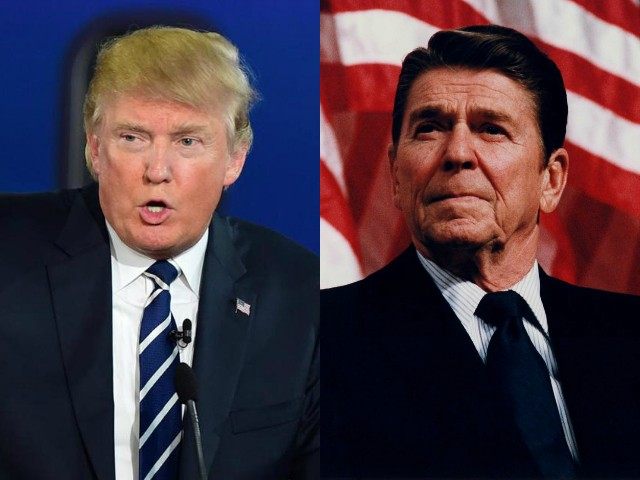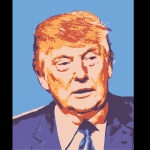This essay is part of our collection “Advice for Donald Trump.” Read related pieces here.
As Donald Trump neared the end of his speech accepting the Republican nomination for the presidency, some conservative commentators noted—with evident disapproval—that he had not yet used certain recognizably conservative words, such as “Constitution” and “freedom.” Conservatives have raised this concern about Trump’s rhetoric before, especially those who understand themselves as the admirers and heirs of Ronald Reagan. This concern—and indeed the entire Trump-Reagan comparison—deserves serious attention, because it can help us to understand more accurately the character of conservative statesmanship.
It is certainly true that Donald Trump—as both a candidate and a man—is very different from Ronald Reagan. Accordingly, Trump’s nomination acceptance speech differs considerably from Reagan’s. Before considering the differences, however, it is perhaps worthwhile noting one similarity: both men said in their convention speeches pretty much what they had been saying throughout their entire candidacies, from their announcement speeches all the way through the primaries.
This indicates that neither Reagan nor Trump is a standard-issue Republican politician—a trimmer who tacks right to win the nomination and then tacks to the center to win the general election. This consistency implies a certain candor. Such candor, though not itself responsible statesmanship, is at least a precondition for it. The democratic statesman seeks to win the people’s consent to a broadly conceived policy direction. That aim precludes the kind of maneuvering, double-talk, and subtle signaling by which many candidates try to win the support of a hundred different factions voting on the basis of a hundred different (and perhaps conflicting) interests.
Start your day with Public Discourse
Sign up and get our daily essays sent straight to your inbox.This much, of course, offers little comfort to conservatives who think Trump is not one of them. After all, any honest conservative will admit that Bernie Sanders is a genuine “conviction politician” without being in the least tempted to vote for him. It is possible that Trump is being entirely honest about what is on his mind, but that his rhetoric demonstrates decisively that he is not a conservative and, indeed, that his political orientation is such that no real conservative could approve it. To determine if this is the case, we must consider the substance of the problem noted in Trump’s rhetoric: his neglect of the Constitution and of freedom.
Respect for the Constitution
As it happens, there is not much rhetorical difference between Trump and Reagan on the Constitution—at least not if we confine our attention to their convention speeches. Trump mentioned the Constitution one time, in the context of promising to nominate judges who would uphold it. Reagan did not mention the Constitution at all.
Of course, it may be that Reagan mentioned the Constitution more often than Trump in other contexts. Certainly Reagan was fond of citing the American founders, while Trump is not. The more important point here, though, is that conservatives should not oversimplify the task of judging the quality of political leadership by how often it invokes the Constitution.
Respect for the Constitution is undeniably essential to the preservation of our political way of life, which is what any form of conservatism seeks to achieve. At the same time, in order to win the consent of the governed, the conservative statesman has to grapple with the problems that confront the country and that are on the minds of most voters. And in some cases, at some times, the Constitution will be largely irrelevant to those challenges and those concerns.
To a considerable extent, this was the case with Reagan. His acceptance speech identified “three grave threats to our very existence, any one of which could destroy us”: a “disintegrating economy, a weakened defense, and an energy policy based on the sharing of scarcity.” Reagan did not argue as if the Constitution had any bearing on these problems, and it is hard to see how he could have done so. As is well-known, Reagan thought the nation’s weak economy was due primarily to over-taxation. The Constitution, however, clearly bestows on Congress a power to levy taxes on the people of the United States. It therefore authorizes both prudent and imprudent, economically energizing and economically crippling, levels of taxation. Accordingly, Reagan attributed the country’s sorry economic state not to unconstitutional forms of taxation but to foolishly self-injuring levels of taxation.
And so with the other issues Reagan confronted. He implicitly conceded the federal government’s constitutional authority to regulate energy production and use, but he argued that it was being used in such a manner as to discourage the production of a plentiful and affordable supply of energy. Similarly, the Constitution could provide no guidance on the question of America’s military strength. It clearly authorizes Congress to create a military force, without in any way trying to specify what level of military expenditure would make America safe and respected in the world.
The Constitution Doesn’t Prescribe Contemporary Public Policy
If Reagan is a good example of principled political leadership—and almost all American conservatives think that he is—then we can learn something from him here. Reagan was certainly not just a Republican but a “movement conservative.” Though he was not a scholar or an intellectual, Reagan was a self-motivated and self-educated adult convert to conservatism. Unlike Donald Trump, he had thought carefully about conservatism as a system of ideas and had internalized its respect for the Constitution.
At the same time, Reagan was not only a movement conservative. He was also a competitive politician determined to win the presidency by meeting the people where they were, addressing the concerns that he thought were dominating their minds. And although he respected the Constitution, he evidently saw no need to interject it artificially into his conversation with the voters where he judged it to be irrelevant.
Trump seems to confront a similar situation. Although he has adopted some positions that are drawn from “movement conservatism”—such as cutting taxes, protecting the unborn, and appointing constitutionalist judges—his signature issues are immigration, trade, and foreign policy. Trump thinks that these are the most important issues the country faces, and he thinks that a majority of voters agree with him or can be brought to agree with him.
Yet it would not be of much use to invoke the Constitution in relation to these questions. The Constitution gives the federal government the authority to regulate commerce with foreign nations and to establish a rule of naturalization. Accordingly, our fundamental law equally permits a liberal immigration policy and a restrictive one. It equally permits a policy of free trade as well as a policy of protection of domestic manufacturing. Similarly, the Constitution places responsibility for the conduct of foreign policy in the federal government, but it says nothing as to the specific principles that should guide that policy. It equally permits a foreign policy based on altruistic and humanitarian concerns and one based on national self-interest.
In the course of our history, the government has at different times allowed high and low levels of immigration. It has in some periods protected and promoted American industry, while in others it has pursued the path of free trade. Its foreign policy has been informed by Hamiltonian realism in some epochs and by Wilsonian idealism in others. All of these policies were constitutional at the time they were in force, and any of them would be constitutional now. It is also perhaps worth noting that all of them have been advocated at some time or another by statesmen who could be considered conservative.
More Freedom Is Not the Answer to Every Political Problem
The difference between Reagan and Trump on freedom is much more real. Trump hardly mentioned it in his acceptance speech, and it is not a mainstay of his rhetoric in any other setting. Reagan mentioned it repeatedly in his acceptance speech, and it was a hallmark of his speeches throughout his public career.
Even here, however, conservatives should resist the temptation to judge Trump’s speeches on the prevalence or paucity of his invocations of freedom as a theme. My point here is not to defend Trump or the positions he has chosen to emphasize. It is only to counsel conservatives against evaluating him or any other politician in such a simplistic manner. To do so is to foster in ourselves a tendency to doctrinaire thinking, which in turn will not only distort our judgments about Trump, but, more importantly, will impede our ability to make any sound judgments about what is and what is not a defensible conservative statesmanship in the future.
Freedom is certainly a great good, to be cherished by all upright citizens. It is also, however, only a partial good—one of the elements of the common good, but not the common good itself. A fully good country is not characterized by freedom alone any more than it is characterized only by prosperity, power, security, virtue, or any other important but limited good. It is the job of conservatives to avoid excessively ideological thinking about politics and to remind others to do so, to resist the temptation—so characteristic of modern politics—to reduce the public good to a rigid adherence to some simple formula.
Both the left and the right have characteristic errors. The great error of the contemporary left is to treat equality as the answer to everything, to think, speak, and act as if more equality necessarily means a better society. Everyone on the right sees that this is a fatal error. The great error of the contemporary right, or at least its great temptation, is to treat freedom as the answer to every public question, to think, talk, and act as if a freer society is always a better one. Part of the job of traditional conservatives is to resist that error of the right, to remind their fellow citizens that freedom is not the answer to every political question, not the solution to every political problem. But they undermine their ability to perform this essential service if they give in to the temptation to criticize a candidate, however objectionable they may find him, simply for not saying the word “freedom” often enough.
Many conservative intellectuals yearn for and seek to foster the possibility of conservative statesmanship. Many of them are in a state of despair because they believe that in Donald Trump we are witnessing the arrival of the opposite of the conservative statesman, the populist demagogue. If they believe this, they have a duty to offer a critique of him.
They should beware, however, the temptation we all face when we care deeply about a political cause: the temptation to seize and use the most striking and stinging criticisms, instead of the most sensible and balanced ones. Put another way, the conservative should not act the ideologue in order to attack the demagogue, because the simplistic thinking of the ideologue is just as hostile to true statesmanship as the angry passions of the demagogue.














